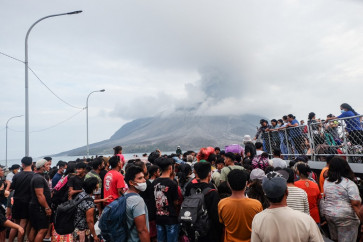Applications for ISPO certification opens in 2012
The government will start collecting applications for a mandatory sustainable palm oil scheme by early 2012, expecting all Indonesian oil palm plantations to be certified in 2014 at the latest, a top palm oil commission executive says
Change Size

T
he government will start collecting applications for a mandatory sustainable palm oil scheme by early 2012, expecting all Indonesian oil palm plantations to be certified in 2014 at the latest, a top palm oil commission executive says.
Industrial futures: Indonesian Palm Oil Producers’ Association (GAPKI) chairman Joefl y Bahroeny (right) delivers his views on the prospects for the palm oil industry, watched by Mona Surya, the organizing chairwoman of the seventh Indonesian Palm Oil Conference in Nusa Dua, Bali, on Thursday. The two-day conference, attended by some 1,100 participants, ends Friday. Antara/Nyoman Budhiana
The Indonesian Palm Oil Commission deputy executive director Rosediana Suharto said on Thursday that the government would first assess oil palm plantation management based on various aspects including legalities, cultivation practices and social and environmental factors as part of a pre-certification arrangement. The result of the assessment would be classified in five classes, with the first through the third classes eligible to move further for certification requests.
“The government will provide assistance for plantations under the determined rank to fulfill the requirements,“ she said on the sidelines of the seventh Indonesian Palm Oil Conference in Nusa Dua, Bali.
The two-day conference kicked off on Thursday without the presence of Coordinating Economic Minister Hatta Rajasa, who was scheduled to open the annual event. As many as 1,100 local and foreign participants, including experts, businesspeople and officials, joined the event, which ran in conjunction with an exhibition.
The government-backed Indonesian Sustainable Palm Oil (ISPO) certification scheme was unveiled in late 2009 after consumer product giants suspended crude palm oil purchases from several major Indonesian suppliers for alleged deforestation practices in their expansions.
The scheme was scheduled to be implemented in August this year but was delayed due to administrative preparations.
The government commenced a trial of the scheme in March at 20 oil palm plantations run by private and state plantation firms.
Rosediana said that eligible candidates could propose by which auditors — local and international — they wanted to be certified.
“The certification system will follow the international standards to certify palm oil according to the standards approved by the World Trade Organization [WTO], and in this case, of the International Organization for Standardization [ISO],” she said, citing ISO decrees on quality and environmental management system auditing, environmental management systems on quality management systems.
She said that as the scheme was set to be mandatory for all palm oil plantations, it would result in punishment — mainly administrative measures — for those failing to comply with the rules.
Local palm oil businesses welcomed the government’s commitment to implement the ISPO scheme.
Daud Harsono, head of research and environment division at the Indonesian Palm Oil Producers Association (Gapki), said that the ISPO scheme was an inevitable measure for Indonesia, the world’s largest palm oil producer, to cope with sustainability issues in future palm oil production.
“Unlike the RSPO [Roundtable on Sustainable Palm Oil], the ISPO is more producer-driven, with local stakeholders expecting to further advance the domestic palm oil industry, which is pro-environment, pro-job, pro-poor and pro-growth,” he said.
Daud added that both schemes would be complementary rather than competing.









